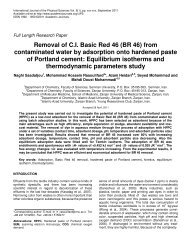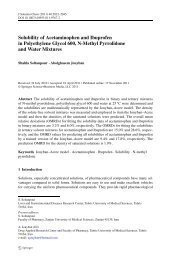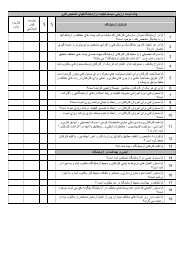new insights into the prevention and treatment of bulimia nervosa
new insights into the prevention and treatment of bulimia nervosa
new insights into the prevention and treatment of bulimia nervosa
Create successful ePaper yourself
Turn your PDF publications into a flip-book with our unique Google optimized e-Paper software.
32<br />
New Insights <strong>into</strong> <strong>the</strong> Prevention <strong>and</strong> Treatment <strong>of</strong> Bulimia Nervosa<br />
It is noteworthy that <strong>bulimia</strong> may be suspected also in patients undergoing bariatric surgery.<br />
Indeed, this kind <strong>of</strong> surgery, also named weight loss surgery, includes a variety <strong>of</strong> procedures<br />
performed on people who are obese. Weight loss is achieved by reducing <strong>the</strong> size <strong>of</strong> <strong>the</strong><br />
stomach with an implanted medical device (gastric b<strong>and</strong>ing) or through removal <strong>of</strong> a portion<br />
<strong>of</strong> <strong>the</strong> stomach (sleeve gastrectomy or biliopancreatic diversion with duodenal switch) or by<br />
resecting <strong>and</strong> re-routing <strong>the</strong> small intestines to a small stomach pouch (gastric bypass surgery).<br />
When determining eligibility for bariatric surgery, psychiatric screening is critical.<br />
Bulimia <strong>nervosa</strong> may lead to significant morbidity <strong>and</strong> mortality. The diagnosis depends on<br />
obtaining a history supported, as appropriate, by <strong>the</strong> corroborative account <strong>of</strong> a parent or<br />
relative. This will require an empathic, supportive, non-judgemental interview style in<br />
which <strong>the</strong> person is enabled to reveal <strong>the</strong> extent <strong>of</strong> his or her symptoms <strong>and</strong> behaviours.<br />
Although those with <strong>bulimia</strong> <strong>nervosa</strong> generally have fewer serious physical complications<br />
than those with anorexia <strong>nervosa</strong>, <strong>the</strong>y commonly report more physical complaints when<br />
first seen (National Collaborating Centre for Mental Health, 2004). The gastrointestinal tract<br />
is <strong>the</strong> site <strong>of</strong> most acute <strong>and</strong> chronic medical complications <strong>of</strong> <strong>the</strong> disease (Table 1).<br />
Identification <strong>of</strong> any <strong>of</strong> <strong>the</strong> gastrointestinal aspects may aid in establishing an early<br />
diagnosis, which has been shown to increase <strong>the</strong> likelihood <strong>of</strong> recovery.<br />
Effects <strong>of</strong> <strong>bulimia</strong><br />
Dental erosion<br />
Dental caries<br />
Oral dryness<br />
Parotid <strong>and</strong> salivary gl<strong>and</strong>s enlargement (raised serum amylase)<br />
Dysphagia<br />
Esophagitis/oesophageal ulcers<br />
Vomiting<br />
Hematemesis (rare)<br />
Increased gastric capacity<br />
Delayed gastric empting<br />
Gastric rupture (rare, but high letality)<br />
Bloating<br />
Abdominal pain<br />
Diarrhoea<br />
Constipation<br />
Volvulus (rare)<br />
Rectal prolapse (rare)<br />
Table 1. Common adverse effects <strong>of</strong> <strong>bulimia</strong> <strong>nervosa</strong> on <strong>the</strong> gastro-intestinal tract.














![focuspdca.ppt [Compatibility Mode]](https://img.yumpu.com/22859457/1/190x146/focuspdcappt-compatibility-mode.jpg?quality=85)


